PHL300H5 F – Topics in Ancient Philosophy: Hellenistic Philosophy
Instructor: J. Allen T 1-3 PM/R 1 PM – 2 PM
At the dawn of the Hellenistic era, which began late in the fourth century BCE during the first three quarters of which philosophy in the Hellenic (Greek-speaking) world had been dominated by Plato and Aristotle, three new philosophical schools emerged: the Stoics, Sceptics and Epicureans. They were to exert a profound and lasting influence, extending into and beyond the modern era (Descartes and Hume, to mention just two early modern philosophers, were deeply indebted to them). The fact that we still speak of someone as an Epicure or epicurean, a Stoic or stoical, a Sceptic or sceptical, using the ancient Greek terms, is evidence of their enduring influence. We shall tackle the Hellenistic philosophers’ contributions to issues belonging the three main areas of philosophy recognized in the era: Physics or Natural Philosophy (which includes metaphysics and theology), Logic (which includes what we could call ‘philosophy of language’ and ‘epistemology’) and Ethics. Readings will be drawn from Lucretius, Epicurus, Cicero, and Diogenes Laertius and other authors.
Prerequisites: 1.5 credits in PHL
Recommended Prep: PHL200H5 or PHL202H5 and PHL210Y5

PHL307H5 S – Topics in Mediaeval Philosophy
Instructor: TBD M 9-11 AM/W 12 PM – 1 PM
A study of some of the principal figures and intellectual problems in the period from the first century to the sixteenth. Figures such as Philo, Augustine, Abelard, Avicenna, Maimonides, Aquinas, Duns Scotus, Ockham and Suarez will be studied on topics in metaphysics, epistemology, ethics and philosophy of nature.
Prerequisites: 1.5 credits in PHL
Exclusion: PHL309H1
Recommended Prep: PHL200Y5 or PHL210Y5

PHL324H5 S – The Continental Tradition
Instructor: M. Delhey T 1-3 PM/R 1-2 PM
A study of recent traditions of continental philosophy such as phenomenology, existentialism, hermeneutics, critical theory, structuralism and post-structuralism. Figures such as Husserl, Heidegger, Sartre, the Frankfurt school, Lacan, Foucault, Deleuze and Derrida.
Prerequisites:1.5 credits in PHL
Exclusion:PHL320H1 or PHL321H1
Recommended Prep:PHL210Y5 or PHL310H5 or PHL312H5 or PHL317H5
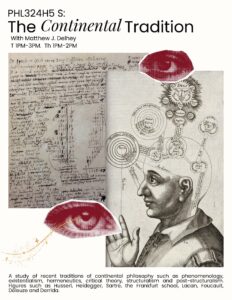
PHL325H5 F – Early Analytic Philosophy
Instructor: B. Yi M 11-1 PM/W 11-12 PM
This course is the first part of an examination of the analytic tradition in philosophy. In the course, we will study among others Frege, Moore, Russell, and Wittgenstein.
Prerequisites:PHL245H5 and 1.5 additional credits in PHL
Exclusions: PHLC43H3
Recommended Prep:PHL210Y5
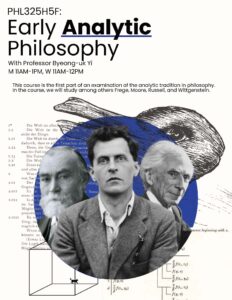
PHL332H5 S – Metaphysics
Instructor: B. Yi M 11-1 PM/W 10-11 AM
This course gives an introduction to metaphysics and discusses some of the longstanding topics in the area. Topics discussed in the course include theories of categories, the distinction between universals and particulars, the existence and nature of universals, causation, and the nature of time.
Prerequisites: 1.5 credits in PHL
Exclusion: PHL330Y1, PHL331H1, PHLC60H3
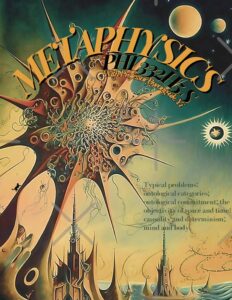
PHL333H5 F – Epistemology
Instructor: N. Das M 3-5 PM/W 3-4 PM
Typical problems: knowledge and belief, perception, the analytic-synthetic distinction, theories of truth, necessity, and the a priori.
Prerequisites: 1.5 credits in PHL
Exclusion: PHL330Y1, PHL332H1

PHL340H5 F – Philosophy of Mind: The Limits of Consciousness
Instructor: E. Carter T 10-11 AM/R 9-11 AM
Conscious experience is crucially important to metaphysics (our theories of what the world is like), epistemology (our theories of knowledge), and ethics (our theories of what matters and what we ought to do). Each of us has our own stream of consciousness, but which other things in the world have it, and how could we know? This course explores the limits of consciousness in the world—the creatures or artifacts that might have it and theories of why they might or might not, as well as the different forms that it might take. We’ll consider theories that restrict consciousness to cognitively sophisticated creatures and also theories that posit that consciousness is everywhere (even in rocks or elementary particles), as well as theories that draw the line somewhere in between. We’ll ask whether there is consciousness in other mammals, in fish or insects, or in ChatGPT. We’ll consider whether it can come in degrees, and whether there might be multiple streams of consciousness within a single person. And we’ll consider how these different ideas should influence our ethical decisions, taking into account the experiences of everyone (and everything) that our actions might affect.
Prerequisites: 1.5 credits in PHL

PHL343H5 F – Freedom and Determinism
Instructor: P. Clark M 10-11 AM/W 9-11 AM
This course will examine the question of whether determinism is true, and to which extent and whether, determinism is compatible with the possibility that our will is free as well as the relation between freedom and responsibility. In particular, we will look at the plausibility of views such as compatibilism, hard determinism and libertarianism.
Prerequisites: 1.5 credits in PHL
Exclusion: PHL241H5
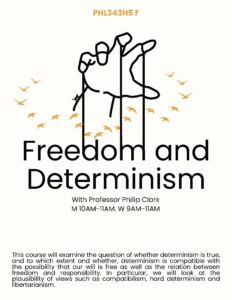
PHL345H5 S – Intermediate Logic
Instructor: B. Yi M 2-3 PM/W 1-3 PM
This course is the second part of a two-term sequence introduction to logic. (The first part is PHL245, Modern Symbolic Logic, which is a prerequisite for this course.) In this course, we complete the study of Predicate Logic initiated in PHL245 and study Identity Theory and some topics beyond the standard Predicate Logic with Identity. [36L]
Prerequisites:PHL245H5 and 1.0 credits on PHL
Exclusion:PHL345H1 and PHLC51H3
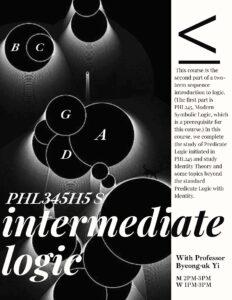
PHL346H5 S – Choice and Chance
Instructor: J. Weisberg W 9-10 AM/ F 9-11 AM
An intermediate level look at reasoning and decision making in the face of uncertainty. Topics may include: decision theory, game theory, social choice theory, confirmation theory, foundations of probability and statistics, puzzles of infinity and self-location, and the relationship between knowledge and uncertainty. [36L]
Prerequisites:1.5 PHL credits
Recommended Prep:PHL246H5 or any first course in probability/statistics/decision-making

PHL355H5 S – Issues in Philosophy of Science: Empiricism, explanation, laws, causation, realism vs anti-realism, and reduction.
Instructor: A. Koo T 9-11 AM/F 11-12 PM
This course will explore select movements in the Philosophy of Science during the 20th and 21st centuries. We will ask fundamental metaphysical questions about how to interpret what science says about the universe, such as: What are laws of nature? What is causation? Is everything just physics? Epistemic questions will focus on what attitudes towards science we are justified in holding. Are we justified in believing that science is true? What do our epistemic beliefs entail for our ontological commitments?
No technical skills in science are required for this course. All that is needed is a healthy interested in science.
Prerequisites: 1.5 credits in PHL
Exclusions: PHL355H1
Recommended Preparation: PHL245H5 or PHL255H5
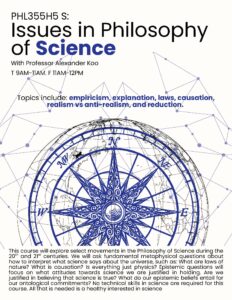
PHL357H5 F – Philosophy of Biology
Instructor: Z. Raza W 2-3 PM/ F 1-3 PM
Conceptual issues in modern biology. Topics may include natural selection, biological kinds, the role of evolution in explaining human attributes such as rationality, cooperation, and communication, reductionism in molecular biology, and functional explanation in biology.
Prerequisites:PHL255H5 or PHL355H5 and 1.5 PHL credits
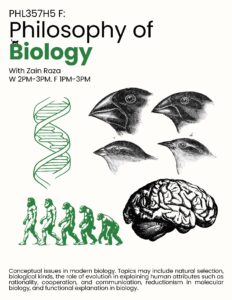
PHL358H5 S – Philosophical Issues in Cognitive Science: Distinctively Human Cognition
Instructor: J. Nagel M 3-5 PM/ W 3-4 PM
This course examines some of the most philosophically controversial features of human mental life, including social cognition, reasoning, and consciousness. What capacities are distinctively human? We will explore human cognition in contrast with the abilities of other animals, and in the light of new types of artificial intelligence.
Prerequisites: (PHL340H5 or PHL345H5 or PHL350H5) and 1.5 additional credits in PHL
Exclusion: COG250Y1

PHL360H5 S – Philosophy of Artificial Intelligence
Instructor: L. Fletcher T 4-6 PM/F 2-3 PM
This course examines contemporary artificial intelligence from a philosophical perspective. Topics include: the nature of intelligence, comparisons between biological and artificial learning, linguistic understanding and grounding in foundation models, moral guidance for AI systems, and the moral status of artificial agents.
Prerequisites: 1.5 credits in PHL

PHL365H5 F – Issues in Political Philosophy
Instructor: B. Brown T 12-1 PM/R 11-1 PM
This course considers what it means for us to be good subjects and makers of laws. In the first unit we consider whether citizens have a moral obligation to do what the law commands. In the second, we question whether the citizens of democratic states have an ethical obligation to vote. In the third we investigate who has a claim to become a member of a given political community and what rights they must be given. In the final section, we consider the value and appropriate structure of democratic governance.
Prerequisites: 1.5 credits in PHL
Exclusions: PHL366H1
Recommended Prep: PHL265H5 or PHL277Y5
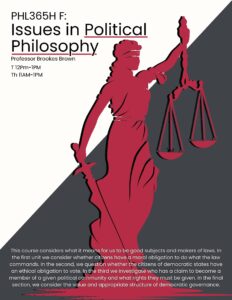
PHL366H5 F – The Ethics of Borders and Immigration
Instructor: B. Brown T 3-6 PM
This course considers the ethics of national borders and immigration rules. Topics to be considered will include the ethics of restrictive rules about entry or exit from countries, prioritization of certain potential immigrants over others, and the justification for denial of citizenship or removal from a country.
Prerequisites: 1.5 credits in PHL
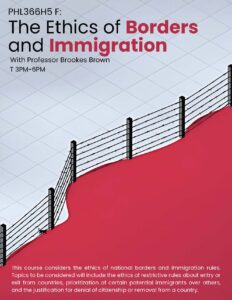
PHL370H5 S – Issues in Philosophy of Law
Instructor: A. Sepielli T 11-12 PM/R 10-12 PM
A study of major issues in the philosophy of law such as the nature of law, responsibility and punishment, the obligation to obey the law, and the moral underpinnings of particular areas of law (e.g. criminal, tort, contract).
Prerequisites: 1.5 credits in PHL
Recommended Prep: PHL271H5 or PHL277Y5

PHL374H5 F – Issues in Normative Ethics: Non-Consequentialism and Prohibited Acts
Instructor: S. Tenenbaum T 9-11 AM/R 10-11 AM
Most people seem to accept the following basic moral rules: “Do not kill (the innocent)”; “Do not lie”; “Do not torture”. These prohibitions seem to extend even to cases that the benefits of engaged in such acts might be greater than the harms caused by it. This course will examine the nature of such prohibitions that seem to be at the very core of ordinary morality, as well as attempts to determine in which circumstances (if any) it is legitimate to act in violation of them.
Prerequisites: 1.5 credits in PHL
Exclusions: PHL375H5 or PHL376H1 or PHLC05H3 or PHLC06H3
Recommended Prep: PHL275H5 or PHL277Y5
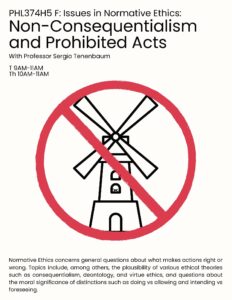
PHL376H5 F – Issues in Metaethics
Instructor: N. Charlow M 11-12 PM/W 1-3 PM
If ethics is the study of questions about right and wrong, meta-ethics is the study of questions about ethical questions — the study of questions concerning questions of right and wrong. Many philosophical issues fall under this general umbrella. Linguistic questions: what is the meaning of the language in which ethical questions and assertions are given? Psychological questions: what sort of activity is it to engage in ethical inquiry, or to reason about ethical questions? Epistemological questions: how it is possible to arrive at answers to ethical questions? Metaphysical questions: are the answers to ethical questions objective or “mind-independent”? These are the kinds of meta-ethical questions we’ll look at in this course.
Prerequisites: 1.5 credits in PHL
Exclusions: PHL375H5 or PHLC05H3 or PHLC06H3
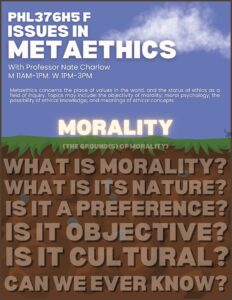
PHL388H5 F – Philosophy of Literature: Goethe’s Faust
Instructor: O. Ware W 3-6 PM
This course explores the relationship between literature and philosophy. In addition to examining the historical tension between poets and philosophers, students will study how selected literary works, classic and contemporary, and from Western and non-Western traditions, engage with philosophical questions and ideas. Topics may include love, the soul’s journey, death and rebirth, and the conflict between good and evil. The course will also consider philosophical issues related to translation, adaptation, and interpretation.
Prerequisites: 1.5 credits in PHL
Exclusions: PHL388H1

